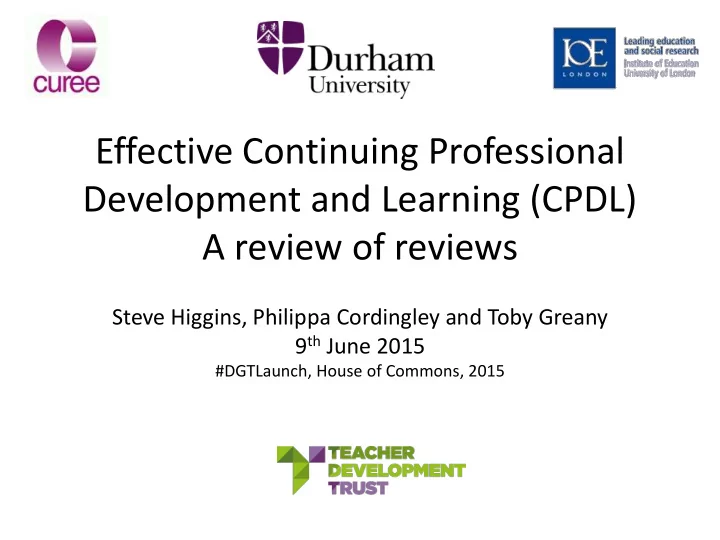

Effective Continuing Professional Development and Learning (CPDL) A review of reviews Steve Higgins, Philippa Cordingley and Toby Greany 9 th June 2015 #DGTLaunch, House of Commons, 2015
Review approach • ‘Umbrella’ review: – Provides a rapid consolidated view of the field – May miss most recent evidence – Can identify evidence gaps • Balance between speed and being systematic • Search approach – Connoisseurial review plus standard search for rigorous CDP/TPD/teacher learning studies in English since 2000 • 947 ‘hits’ identified, 46 screened. Included and classified: – 1 consistent and rigorous – Timperley (2007) – 3 robust, but specific – 4 persuasive – 1 plausible
Classification of claims 1 Consistent and rigorous Consistently positive impact on student outcomes from studies with research designs appropriate for causal inference 1 across studies. 2 Robust, but specific Examples of positive impact on student outcomes from research designs appropriate for causal inference. 3 Persuasive Supported by evidence of impact on student outcomes from research designs without causal evidence (e.g. correlational studies). 4 Plausible Consistent with the available evidence, but not directly supported with data. 1 Randomised trial, well matched experiment, regression discontinuity, etc
School leaders CPD Peers facilitator Teacher Carefully designed/aligned Teacher CPDL with a strong focus on pupil outcomes has a significant impact on Pupils student achievement - consistent finding across all reviews
Time Findings 1. Substantive development has to be sustained over time- 2 terms plus (but one-offs can work for very specific practices) 2. Multiple, iterative activities and opportunities following initial instruction to refine/adapt practice in multiple contexts in light of pupils’ responses 3. Time alone isn’t enough - Banarama principle!
Participants Findings 4 Need: • individual starting points to be recognised and develop a collective sense of purpose • to focus on aspirations for pupils and how they learn/ progress in response to teachers’ learning • to explore existing theories, beliefs and practices, but often challenge these 5 Relevance matters - but that and volunteers vs conscripts matter less than environment / time /peer learning/ focus on pupils Coe, Cordingley, Greany, Higgins, Teacher Development Trust, forthcoming
CPDL Approaches Findings 6 Formative assessment is key – for modelling approaches, refining support, contextualising for subjects/ pupil groups and evaluating impact 7 Need for external input, to challenge orthodoxies supportivel y - sometimes complemented by internal specialists. 8 Facilitators as subject, evaluation and process experts 9 Peer support - learning together with peers; reciprocal vulnerability speeds up risk taking Coe, Cordingley, Greany, Higgins, Teacher Development Trust, forthcoming
Approaches Findings 11 Setting out deliberately to develop meta-cognitive control eg by : – Analysing and evaluating CPD content and evidence re pupils’ responses and interpreting them; and – Iterative opportunities to encounter, understand, respond to and reflect on new approaches as part of the day job 12 School leaders must create the conditions for this - resources, modelling and challenge 13 No single element or process works – crucial to combine them, align them with goals – effectively! Coe, Cordingley, Greany, Higgins, Teacher Development Trust, forthcoming
What doesn’t work? • Generic pedagogic CPD – contextualisation for subjects and pupils is crucial • Telling teachers what to do or providing materials without chance to develop skills and explore impacts • Failing to provide a strong focus on aspirations for pupils or assessing links between teacher and pupil learning • Providing time and or frequent support without structured opportunities to engage with, understand and reflect on the implications of new approaches/ practices
Practice implications? • Be clear about what you want to achieve and the implications for designing and resourcing CPDL – time is the key • Set explicit and high expectations of pupil learning oriented CPDL • Expect facilitators to be able to define their practical theory - what will be different and why – and explore that with teachers • Expect facilitators to model and use AFL for teachers throughout • Define and implement a structured, formative, collaborative process with a regular rhythm which engages teachers and involves multiple opportunities to apply and test learning in practice and to gather evidence and reflect on impact • Link this learning to wider school processes and journey – eg performance management • If it’s not challenging it’s probably not learning!
Policy implications? • Caveat: nature of evidence in relation to school-led system • How can schools/alliances be incentivised to provide the resources and commitment required? • How should appropriate external expertise be brought in? • How to develop facilitators of effective CPDL at scale? • How to ensure a focus on generic and subject specific knowledge and pedagogy? • Peer support and learning necessary but not sufficient. Does focus on Joint Practice Development risk introverted models that recycle existing practice? • Links to work on evidence-informed practice and knowledge mobilisation?
Further research • Overlaps and some potentially significant differences between subjects • Patterns were valid either to all subjects or for science and maths or science and literacy. There was no overlap between mathematics and literacy • Facilitator contributions for Maths and Science were distinctive • We need to understand this better by analysing the individual studies behind key findings; and • We need to explore specifically what is known about school based and school to school supported CPD
Recommend
More recommend